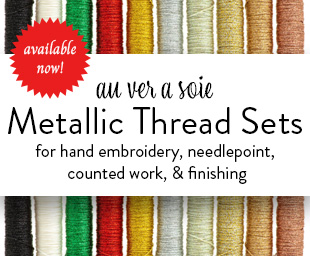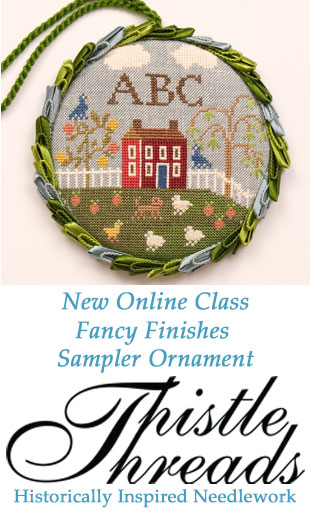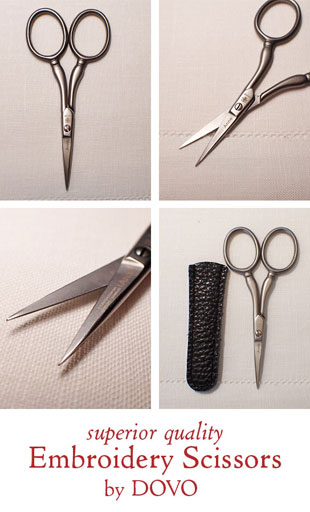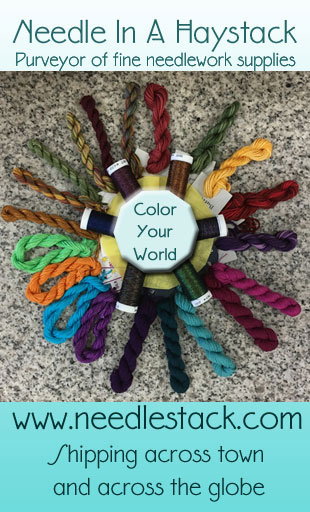Hand embroidery begins with a few basic stitches. Once these stitches are mastered, it’s very easy to move into other specific embroidery techniques. Here, you can see diagrams of different stitches, with an explanation of how to execute them. The stitches are categorized by “stitch families” – for example, outline stitches, chain stitches, detached stitches, knots, filling stitches, etc. Each “family” has its own page. For more complex forms of stitchery, I suggest purchasing a good book, but for the basics, you can pick them up pretty easily here.
- Line Stitches: Running stitch, whipped running stitch, backstitch, outline stitch, stem stitch, and couching.
- More Line Stitches: Coral Stitch, Scroll Stitch, Portuguese Knotted Stem Stitch
- Chain Stitches
- Detached Stitches & Knots
- Buttonhole Stitch & Its Various Uses
- Filling Stitches – Part I: fishbone and flat stitch
- Filling Stitches – Part II: Satin Stitch
If you would like to see video tutorials of these stitches and more, please visit the Video Library of Stitches.







Dear Mary
thank you so much for your clarity and encouragement in stitching instructions. I am a total beginner, at 44 years old, to embroidery and find it a bit overwhelming – however, your wonderfully illustrated and written instructions inspire me! Vicki Earthrowl
Thanks, Vicki! Don’t be overwhelmed! Do it for fun and relaxation, and you’ll find that, after a while, you can tackle any of this stuff! Keep going!
Dear Mary,
thanks so much for the cleardescriptions and everything. I am a beginner at 38 years old I will definetly be back so expect to see a lot more of me. Your descriptions were wonderfully described and written descriptions were very clear,
from a loyal embroiderer,
mary(my name to)
Dear Mary,
I am so glad to have found this site! I now have it in my favorites. Thank you so much for the stitch instructions. My question is about the type of thread you used in the satin stitch video. “Cotton Abroder”? I am having trouble finding it, where should I look? I really liked the sheen. My work is usually done with paint…I’m getting into learning to “paint” with thread…your video tutorials are a huge help!Thanks,
Candace Wagner
Hi, Candace – I get my coton a broder through Lacis in California. They have an excellent online catalog, which you can find here:
http://lacis.com/catalog/
If you look under Materials, then Cords & Threads, then Needlework, DMC, etc., you’ll find a selection of coton a broder. Look for the one labeled “cutwork thread #25”, which comes in 17 colors. That’s what I’m using. You can also order #16 in colors, as well as smaller sizes (up to #40) in white.
Hope that helps!
Hi,
This is a very good site for learning the stitches. But I still have some doubts on the thickness of threads to use for each type. Also it would be great if you can show some color combinations for the options that you have suggested
Princy
Hi,
I just found your site and love the videos. I recently fell in love (again) with hand embroidery. The videos have been very helpful as a refresher.
Golden Girl
plz include stamen stitch(hand embroidery) also
Hi, Mec –
This is also called “pistol stitch,” I think. It’s simply an elongated French knot. You’ll find a French knot video tutorial in the video library. All you do is put your needle back into your fabric a bit farther away than you would for a French knot, to give the French knot a tail.
I recorded the pistol stitch a couple weeks ago, so I’ll be editing it soon and it’ll be available as a video in the next couple weeks.
Thanks,
MC
Hi Mary Corbet
thank u for the information.
mec
I have a hard time keeping the back of my designs neat and smooth…any tips? Also – Do you knot the end of your thread in order to hold the start of the stitch? How about at the end? If so can you recommend a knot that is smooth so the back of my designs are just as pretty as the front?
Hi –
I use a waste knot to start, and I either stitch towards the knot, or I clip the knot when I’m finished with that thread, thread my needle, and run the beginning thread through the back of my stitches.
For ending, I run the thread through the back of my stitches, weaving it, or wrapping it, depending on the types of stitches I’ve used.
You can see how to end threads on this video tutorial for running stitch:
Running Stitch and Finishing Threads
Hope that helps!
Mary,
I used to embroider looong time ago. My 11 year old daughter is interested in learning now so I was looking for a “sampler” type project for her. Something simple but ‘educational’. I’ve looked and looked but all I can find is descriptions of samplers instead of patterns. And, I’m looking for a free pattern, too. Might you have any suggestions?
We both thank you very much!
Hi –
Well, with the kids I teach, I found that using a “fun” design – such as any of the iron on patterns available today, or even one of the simpler patterns listed on my patterns page – works fine as a sampler. You just pick different stitches to try, dressing it up.
You could also draw your own sampler. You could draw a series of lines, her name, some little motifs around it, etc., and practice different stitches on that.
Hope that helps!
Mary,
Thanks for creating this awesome website and for offering it as free information. I have twin girls who are 6 and are earning their embroidery badge for Faith Keepers (Keepers of the Home). I haven’t done embroidery since I was a teen and had forgotten much. The girls have had an easier time of learning a stitch because they can watch the video. Thanks so much!
Tam
Hi, Tam –
I’m so glad your little girls can watch the videos and learn to embroider! That’s great!! And six years old – I think it’s really wonderful to see kids learning, at a young age, how to stitch!
Best,
Mary
Embroidery looks fun! I’m going to start doing embroidery samplers today. It rox!
I found this site when looking for instructions on how to do different stitches, and it is the easiest one to follow by far. Thank you so much for your clear instructions. I have never done embroidery before but spent the afternoon practicing stitches, and I think I'm ready to start a real project now!
hi mary thanks a lot
iloveyou haha
how,it’s nice to see that you website(needle’n thread) iam a grade 4 student that i have learned is the basting,hemming,running,back stitches it is good educational teaching for the children of the world
Thank you for your teachings
Thank you,
Dominique
Oh my gosh, thank you! I’m so glad to fine you. I can never remember the Stem Stitch and reading over and over again the directions just doesn’t sink in. Your video was beautiful. Just what I needed.
Dear Mary my mother did this all the time and now shes gone. Could you help me learn some stiches by sending some info? via email we just got back in or flooded out house in CR we really dont have cash to spend on such things. Also just quit smoking 12ays ago. Thank You so much.
Hi, Tammy – I think the most helpful thing to get back into embroidery is the video library here on my website. It’s free, and, though some of the videos are somewhat old (I’m in the process of re-filming and replacing them), they are mostly all clear enough to learn the basic stitches. I’ve also got a section here on hand embroidery patters (free) that are helpful, in case you’re looking for a design. Hope that helps!
~MC
Hi Mary:
Thank you so~~~~~~~~~ much for all the video. Before watching your video, I did’t do any stitch. Because I am new to the embroidery, I have a very basic question: Do I need to pull the thread very tight? Thanks!
Hi, Hanyun – Thanks for your question! No, you don’t want to pull the thread very tight. The stitches should just lie on the fabric, without distorting the weave of your cloth. This is much easier to achieve in a hoop or a frame, than by simply holding the fabric in your hands, but if you do hold your work in your hands and don’t use a frame or hoop, you still want to make sure you’re not pulling the stitches enough to make the fabric pucker – just enough that they are lying right on the fabric. You don’t want them loose, either. After a bit of stitching, you’ll get used to the “feel” for pulling the thread just right! ~MC
Dear Mary,
My son (27) has been asking for a hand made quilt. I am told I never make things for us, just for everyone else.
I’m about half way completed with his quilt and already thinking of how to label the back.
Your little heart pattern belongs embroidered on the back of the quilt as a border for my label.
It will be perfect surrounding “Handmade just for you Chris.
Love Always,
Mom”
and the date
Thanks so much,
Sue
Hi, Sue! Thanks for your note! Isn’t it the truth – I find I make things for everyone else, and rarely make anything that’s for my own house. I have one piece of my own embroidery hung in my house, and that’s all that I have made by me. I think it’s great that you’re making your son a quilt, and I’m glad the pattern came in handy! ~MC
hi i just wanna say that you should show pictures and give the way it should be because i think that people would want that because when i acme on this sight i thought that they were giving serine type of embroidery stitches and now i look this is what i get only people talking and this is what i think also i do not have any web sight and i am only in first form doing craft and home economics so this is a grate sight because sometime i came on this sight and i saw a lot of things that interest me and this is what i think i attend to the all saints secondary school in form 1 a3 and my name is Amanda on Facebook and other stuff
i am so sorry for all these misspell spelling i am righting to fast and not reading over came the word should be
Hi Mary, I am from Cape Town South Africa, and was wondering if you had any information on darning stitch motifs to use in a sampler that a friend wants to stitch. Any books available? Where to go to look for info ? Have tried google but only get basic info. I have placed a request at the ASK and Share so am hoping someone comes up with something for us.
Many thanks,
Have a good day,
Regards,
Heather Basson
thankyou for the information!
it was very useful
fab! looking for a website and this was far the best hade one day left to do home work on stiches this website saved my life thank you very much
I saw a couple stitch videos on a friend’s PC. They do not show on y I Pad. What can be done? Your site is so encouraging .
Hi, Patricia. I think the newer videos (stem stitch, for example) should come up fine on the iPad. I’ll have to check to see if the older videos do or not. I’m in the process of replacing the older videos this year, so if they don’t work on the iPad now, they will later! MC
Hi, I am a beginner embroider starting off with a pre-printed pattern, I believe called sunbonnet girls, just not sure what size needle to use? How do you determine that? One site suggested a 10 or 12 needle another a 5 or six?? The kit I purchased has no indication what needle would be best. Also, are you aware of any sites where I could purchase a VERY beginner sampler (alphabet) pattern? I’ve not been able to locate one. Thanks so much. Your site is very inspiring. Kay
Hi, Kay! The size of the needle is determined by the thread that you use. If you’re using regular stranded cotton (like DMC or Anchor embroidery floss), if you use 2 strands, you can use a #8 or #9 crewel (also called “embroidery”) needle. I usually use a 9. If you’re using three strands, an 8 or a 7 will do. The French Needle has a few surface embroidery alphabet samplers available. You might look them up and see if any will suit you. Hope that helps!
MC
Mary-
Thank you for your detailed website. I am teaching a group of 10 year old girls the art of sewing. And they wanted to learn how to embroidery.
Kathleen from Shell Knob Missouri
How do I make a secure buried stitch in fabric instead of tying a knot? I remember doing this in cross stitching but do not know if I can do it when embroidering on a quilt. Thanks, l mahaffey
By your video tutorials and written
instructions, I think someone can learn to do
most embroidery stitches perfectly. You have made a wonderful gift to the world.
Thank you so much, keep well.
I’m a knitters and want to embroider the baby’s name on a corner of the blanket I’m just finishing.
What stitch would be the best to use to write cursive letters in knitted fabric?
I’m a real beginner here!
ThNks so much,
Pat
Hi, Pat – I’d probably use chain stitch, as it will mimic the knitting a little bit, but will still stand out on the knitted background. ~MC
Hi this help me little bit but i want to learn it thoroughly so please help me
dear mary….. i was looking for methods of embroidery, which i need like right now for a a class assignment…..looks as if i don’t have my luck tonight, thanks any way it was nice being here and i shure did learn a lot although it was not my destiny:)
I am looking for an embroidery birth sampler (not counted cross stitch) that I can make for an expected great grandchild. Can you help me find a source?
Hi
Please can you tell me if I can get a book or magazine with embroidery that I can do in Letter to form names.
Many thanks
Mary, picking up the needle again after 35 plus years. Needed some refreshing, your directions were easy to follow and got me back on track. I had forgot how much I enjoy it.
Thanks
Hi, Cindy! Well, that’s good news! I’m glad you rediscovered your enjoyment of embroidery! -MC
Thank you so much for your website– it is wonderful! I just discovered it recently and you cover everything to do with handwork. I am over 70 and have never done much embroidery- so our website is my source for everything! I love that you have lessons that I can work along with. I have printed out the Joy pattern and am working on it for a surprise for my daughter. I am also a quilter and see lots of uses for embroidery in my quilts. I have recommended you site to members of my quilt guild. Thanks again. Jane Dietrich
your video re drizzle stitch was so good – thank you – but I also have pistil stitch needed on current work – can find name but no reference as to how to do it
Hi, June – Pistil stitch is simply a long straight stitch with a French knot on the end. So, instead of forming your French knot right next to where you brought your needle & thread to the front of the fabric, you take a long stitch (the length you want the pistil stitch to be) and before going back down into the fabric, make a French knot at the end of that long straight stitch. The video on French knots may help a bit! ~MC
NICEEEEE <3
I’m looking for a free pamphlet showing the embroidery stitches and how to do them.I was learning to embroidery then my grandmother got I’ll and passed on.if you could send me a free pamphlet with these that would be great.my name is Gail stein. Thank you for your time and consideration in this matter
Hello! I am pregnant with twins (!!) and want to stitch the babies nick names on their coming-home-from-the-hospital outfits (The outfits are fleece). I watched your stem stitch tutorial and it was very helpful. I am a beginner to stitching and have a question. When finished sewing, how do I get the white pattern paper (I know it’s not paper but not sure what it’s called) off? I’m assuming I put that over the clothing to keep my stitching on track, then stitch through that plus the clothing.
Thank you so much!
Emily
Hi, Emily – I’m not sure what you’re using to stitch through? Is it water soluble? Usually the package with say. If you’re just using tissue paper, run your needle along the stitched lines to perforate or tear the paper a little bit, and then gently pick it away. But if it’s gummy of some sort on the back and sticks on the fleece, you’ll have to remove it however the instructions indicate.
Really great and clear instructions. Love stem stitch, use it always but nice to get someone else’s method. Thank you